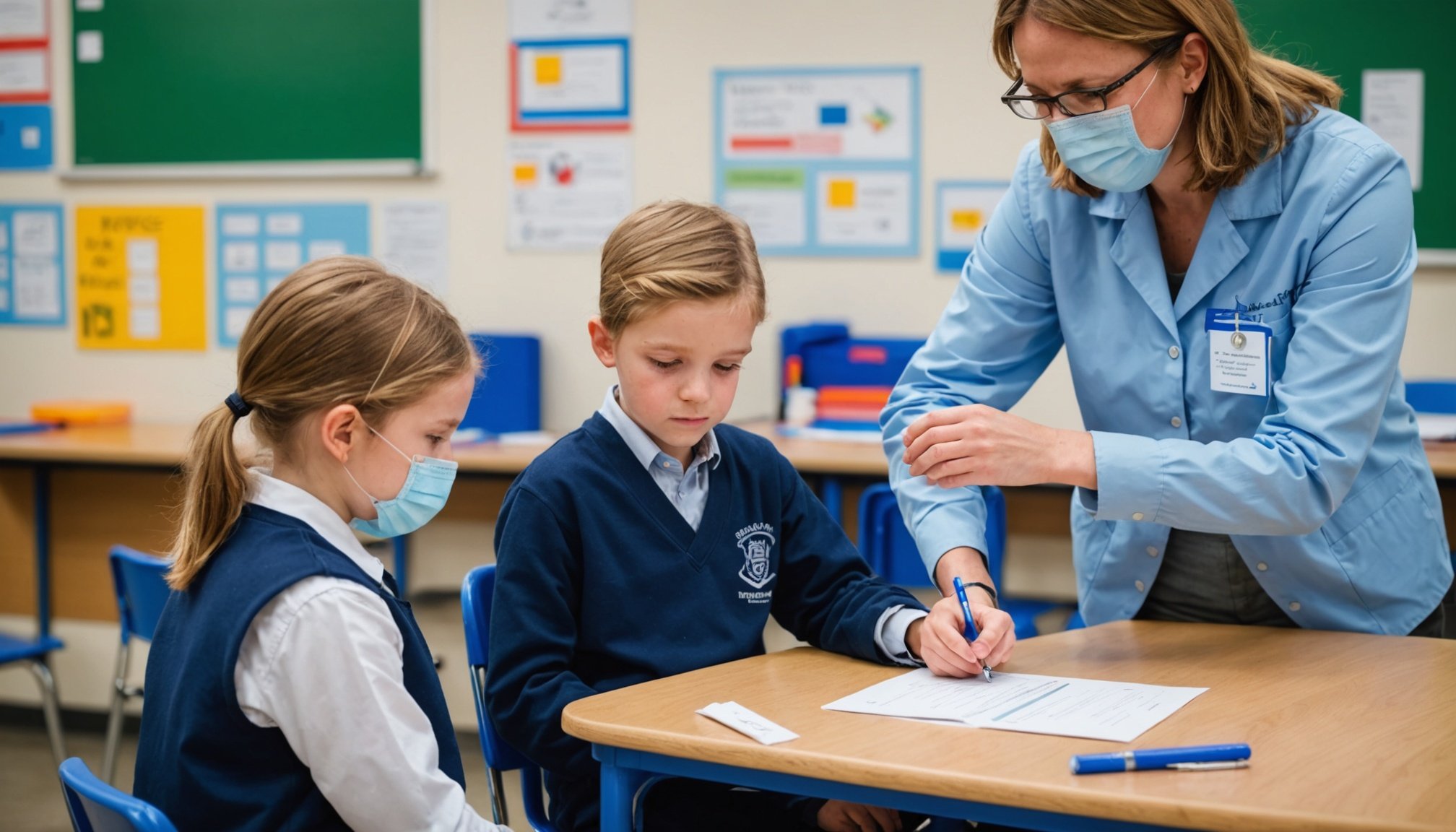Overview of Essential Vaccinations for UK Schools
Ensuring children receive all essential vaccinations is a priority for UK schools. Vaccination requirements are outlined to protect students from communicable diseases. These vaccinations are crucial in maintaining a healthy school environment and include vaccines against diseases such as measles, mumps, rubella, and meningococcal infections.
Schools adhere to a structured academic year timeline to facilitate vaccine administration. Typically, essential vaccinations are administered multiple times. For example, initial doses begin at infancy, followed by boosters throughout childhood — strategically aligning with school entry ages.
This might interest you : Exploring 2023”s New Legislation Impacting the Conservation of Historical Sites in the UK
The necessity of vaccinations extends beyond individual health, mitigating the spread of infectious diseases in schools. Preventive measures curb outbreaks and safeguard vulnerable populations, including those with medical exemptions from vaccination requirements.
Schools often collaborate with local health services to provide clear guidelines for parents, ensuring compliance with vaccination requirements. This collaboration emphasizes the importance of timely vaccinations, illustrating the protective benefits for the school community at large.
Have you seen this : 2023 Updates: What UK Patients Should Know About NHS Prescription Charges
Ultimately, understanding and adhering to vaccination requirements champions public health, reinforcing the collective effort to keep schools safe, nurturing environments conducive to both learning and wellbeing.
Comprehensive List of Mandatory Vaccinations
Understanding the mandatory vaccinations for school attendance in the UK is essential for parents and guardians. The vaccination schedule is structured to protect against multiple communicable diseases, with childhood immunizations starting from infancy and continuing through school years.
DTPaHepB-IPV-Hib (5-in-1 Vaccine)
This combination vaccine protects against diphtheria, tetanus, whooping cough, hepatitis B, polio, and Haemophilus influenzae type b. Administered at two, three, and four months, it requires a booster between ages three and five.
MMR (Measles, Mumps, Rubella Vaccine)
The MMR vaccine combats measles, mumps, and rubella, typically administered at one year with a second dose around age three to five. This two-dose schedule ensures long-term immunity.
MenACWY (Meningococcal Vaccine)
The MenACWY vaccine safeguards against meningococcal groups A, C, W, and Y. Given to teenagers, it’s crucial for pre-university entry aged between fourteen to eighteen and is available through school health services.
The availability and administration of these vaccinations through local health services ensure accessibility. By adhering to the schedule, parents ensure their children are protected, helping maintain a healthy school environment. Parents are encouraged to keep track of booster schedules to uphold immunity levels.
Guidelines and Responsibilities for Parents
In the UK, parental responsibilities play a crucial role in the timely vaccination of children. Parents must ensure their children meet the required vaccination schedule to adhere to school guidelines. Compliance involves providing up-to-date vaccination documentation to schools, confirming immunization status.
Keeping accurate documentation is essential. Schools often require proof of completed vaccinations before admission, making it vital for parents to store this information securely and accessibly. Organize records by maintaining a dedicated folder or digital file that includes all vaccination dates, booster updates, and any relevant medical information.
Staying informed about the vaccination schedule helps prevent missed appointments. Parents can take advantage of reminders from local health services or set calendar alerts. Engaging with these resources ensures children receive all necessary vaccinations on time, maintaining their health and meeting school requirements.
Parents must also understand the exceptions to vaccination requirements. In some cases, medical exemptions can be provided by healthcare professionals. These are typically for children with specific health conditions where vaccination poses a risk, requiring official documentation submitted to the school.
By prioritizing timely vaccinations and proper documentation, parents contribute significantly to a safe and healthy school environment.
Consequences of Non-Compliance
Non-compliance with vaccination requirements can have significant consequences for students and their families. Schools in the UK have definitive policies regarding the attendance of unvaccinated children. One possible outcome is the exclusion of unvaccinated children from school activities, which can interrupt their education and social development. Exclusion typically follows if parents do not provide necessary vaccination documentation or official exemptions.
The impact of non-compliance extends beyond the individual, posing potential health risks to the broader community. Unvaccinated children increase the risk of outbreaks of communicable diseases, jeopardising the health of both vaccinated individuals and those who cannot be vaccinated for medical reasons. These risks highlight the importance of heeding vaccination schedules and maintaining high immunization rates.
Understanding the process for obtaining vaccination exemptions is crucial for those with medical contraindications. These exemptions are typically granted solely on healthcare providers’ recommendations because of specific health conditions that make vaccinations unsafe. Schools require formal documentation substantiating these medical exemptions. Parents should maintain clear communication with educational institutions regarding their child’s health status to avoid misunderstandings and ensure compliance with school policies.
Frequently Asked Questions (FAQs)
Understanding common concerns surrounding vaccinations is crucial for parents navigating vaccination requirements. Here, we address some frequent issues to provide parental guidance and ease concerns.
What if a vaccination is missed or delayed?
If a child misses a scheduled vaccination, parents should contact their local health services to reschedule. Catching up on missed vaccinations is essential to maintain protection against diseases and ensure compliance with school requirements.
Are vaccines safe and necessary?
Vaccines undergo extensive testing and monitoring to ensure their safety and efficacy. They play a pivotal role in preventing outbreaks of communicable diseases in schools, safeguarding both individual and public health.
Where can parents find reliable information on vaccinations?
Parents can access vaccination resources through official government health websites. These sources offer up-to-date information on vaccination schedules, safety, and benefits. Additionally, local health facilities provide support and guidance for any vaccination-related queries.
Addressing these common concerns helps dispel misconceptions and encourages informed decisions. Ensuring that children receive all recommended vaccinations not only protects individual health but contributes to a healthier school community. Parents are urged to stay proactive and seek reliable information whenever needed.
Resources and Additional Support
Navigating the landscape of vaccination resources is crucial for parents wanting to stay informed and ensure their children meet school vaccination requirements. Access to the right support and information can alleviate worries and streamline adherence to the vaccination schedule.
Government health sources are reliable points of reference, offering comprehensive and up-to-date data on essential vaccinations. Parents can consult the National Health Service (NHS) and other official sites for detailed insights into mandatory vaccinations. These platforms provide extensive resources, including guidelines on immunization timing, safety, and effectiveness.
For individualized assistance, local health services are invaluable. These often include clinics and healthcare facilities prepared to answer questions and accommodate vaccination appointments. Contacting local doctors or pediatricians directly can also offer peace of mind and personalized advice tailored to specific health requirements.
Beyond formal establishments, support groups and online communities offer communal guidance where parents can share experiences and seek advice on navigating vaccination challenges. Platforms such as forums or social media groups can provide support and reassurance from others facing similar hurdles, fostering an environment of collective understanding. By leveraging these resources, parents can confidently navigate the vaccination process, ensuring a smooth and informed participation in their child’s health journey.











